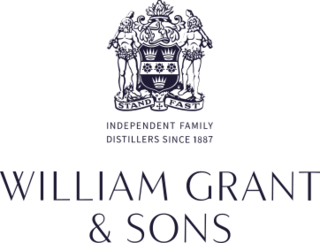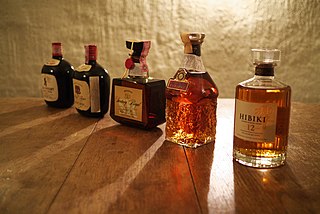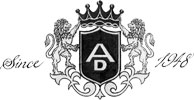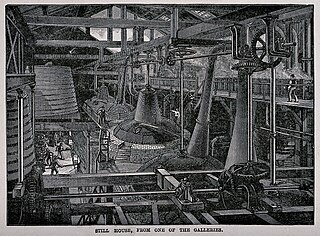
Scotch whisky, often simply called whisky or Scotch, is malt whisky or grain whisky made in Scotland.

Whisky or whiskey is a type of liquor made from fermented grain mash. Various grains are used for different varieties, including barley, corn, rye, and wheat. Whisky is typically aged in wooden casks, which are typically made of charred white oak. Uncharred white oak casks previously used for the aging of port, rum or sherry are also sometimes used.

Single malt Scotch refers to single malt whisky made in Scotland. To qualify for this category, a whisky must have been distilled at a single distillery using a pot still distillation process and made from a mash of malted barley. Therefore, a single malt means that the whisky has not been blended elsewhere with whisky from other distilleries. As with any Scotch whisky, a single malt Scotch must be distilled in Scotland and matured in oak casks in Scotland for at least three years, although most single malts are matured longer.

Thai Beverage, better known as ThaiBev (Thai: ไทยเบฟ), is Thailand's largest and one of Southeast Asia's largest beverage companies, with distilleries in Thailand, UK, and China. It is owned by Thai Chinese billionaire business magnate Charoen Sirivadhanabhakdi. Listed on the Singapore Stock Exchange, Thai Beverage plc has a market capitalization in excess of US$13 billion.

The Glenlivet distillery is a Speyside single malt Scotch whisky distillery near Ballindalloch in Moray, Scotland, that produces single malt Scotch whisky. It is the oldest legal distillery in the Highlands of Scotland. It was founded in 1824 and has operated almost continuously since.

William Grant & Sons Ltd is an independent, family-owned Scottish company that distills Scotch whisky and other selected categories of spirits. It was established in 1887 by William Grant, and is run by Grant's descendants as of 2018. It is the largest of the handful of Scotch whisky distillers remaining in family ownership.

Japanese whisky is a style of whisky developed and produced in Japan. Whisky production in Japan began around 1870, but the first commercial production was in 1923 upon the opening of the country's first distillery, Yamazaki. Broadly speaking, the style of Japanese whisky is more similar to that of Scotch whisky than other major styles of whisky.

Whyte & MackayLtd is a company producing alcoholic beverages based in Glasgow, Scotland. The company is a subsidiary of Alliance Global Group, one of the largest alcoholic-beverage companies in Southeast Asia.
Indian-made foreign liquor (IMFL) is the official term used by governments, businesses and media in India to refer to all types of liquor manufactured in the country other than indigenous alcoholic beverages such as feni, toddy, arrack and others.

English whisky (whiskey) is a liquor made from cereal grains, malt and water that is produced in England. This includes malt whisky and grain whisky.
Royal Challenge, commonly referred to by the abbreviation RC, is a brand of Indian whisky, manufactured by United Spirits Ltd (USL), a subsidiary of Diageo. It was launched in the early 1980s. According to Binod K. Maitin, a United Breweries technician who oversees all the liquor blends for the company, Royal Challenge is a grain flavored whisky, blended with Scotch malts and Indian malts. In an article for The Wall Street Journal, reporter Eric Felton states that, "About 12% of the blend comes from real malt whiskies: some of it made in India, some actual Scotch. The rest of the mix is a neutral spirit distilled from molasses. That means that, strictly speaking, Royal Challenge, like most Indian "whisky", is actually a rum flavored to pass as whisky." The manufacturer has refused to state the percentage of Scotch whisky used in the blend. In the United States, Royal Challenge is referred to as "spirit whisky". Besides India, Royal Challenge is sold in several other countries including the Middle East and the United States.

Amrut Distilleries Ltd is an Indian company that produces distilled beverages. It is best known for its eponymous Amrut brand of single malt whisky, which is the first single malt whisky to be made in India. The brand became famous after world famous whisky connoisseur Jim Murray gave it a rating of 82 out of 100 in 2005 and 2010. In 2010, Murray named Amrut Fusion single malt whisky as the third best in the world. John Hansell, editor of American magazine Whisky Advocate, wrote that "India's Amrut distillery changed the way many think of Indian whisky - that it was, in the past, just cheap Scotch whisky blended with who knows what and sold as Indian whisky. Amrut is making whisky, and it's very good". In 2019, Amrut Fusion Single Malt Whiskey was awarded the "World Whiskey of the Year Award" and Amrut Distilleries was awarded "Word Whiskey Producer of the Year" at the 2019 Bartender Spirits Awards in San Francisco.

Amrut is a brand of Indian single malt whisky, manufactured by Amrut Distilleries. It is the first single malt whisky to be made in India. Amrut (अमृत) or amrit is a Sanskrit word which can be translated as "nectar of the gods", "nectar of life", or "drink of the gods". The company translates it as "Elixir of Life". The brand became famous after whisky connoisseur Jim Murray gave it a rating of 82 out of 100 in 2005 and 2010. In 2010 Murray named Amrut Fusion single malt whisky as the third best in the world. John Hansell, editor of American magazine Whisky Advocate, wrote that "India's Amrut distillery changed the way many think of Indian whisky – that it was, in the past, just cheap Scotch whisky blended with who knows what and sold as Indian whisky. Amrut is making whisky, and it's very good".

Paul John Whisky is a brand of Indian single malt and single cask whisky, manufactured by John Distilleries. The brand launched in London, England on 4 October 2012. Paul John Whisky is made from Indian 6-row malted barley and, for some variants, imported Islay and Aberdeen peat, distilled in traditional copper pot stills and then matured in charred American Oak casks at the company's distillery in Goa, India.
John Distilleries Pvt Ltd is an Indian company that produces distilled beverages, and the company's flagship brand is Original Choice whisky. It also manufactures brandy, whisky, wines, and the award winning single malt whisky called Paul John. The founders have sold 51% of the company to Sazerac Company.

Black Dog is a brand of blended Scotch whisky produced by the Indian beverage company United Spirits Limited (USL), a subsidiary of Diageo.
United Spirits Limited, abbreviated to USL, is an Indian alcoholic beverages company, and the world's second-largest spirits company by volume. It is a subsidiary of Diageo, and headquartered at UB Tower in Bangalore, Karnataka. USL exports its products to over 37 countries.
Radico Khaitan Ltd. (RKL), formerly Rampur Distillery & Chemical Company Ltd., is an Indian company that manufactures industrial alcohol, Indian Made Foreign Liquor (IMFL), country liquor and fertilizers. It is the fourth largest Indian liquor company. Radico brands are sold in more than 85 countries, including USA, Canada, South America, Africa, Europe, South East Asia, Australia, New Zealand and the Middle East.

Officer's Choice, commonly known as OC, is an Indian whisky brand which is owned by Allied Blenders & Distillers (ABD), formerly BDA. It is considered to be one of the largest spirit brands in the world. In 2015 Officer's Choice overtook Smirnoff vodka to become the world's largest selling spirit brand. In calendar year 2014, the brand sold 28.4 million cases, higher than any other spirit brand in the world. Compared to the other Indian whiskies which are mainly made from molasses, OC is made from grain.

The following outline is provided as an overview of and topical guide to whisky:















